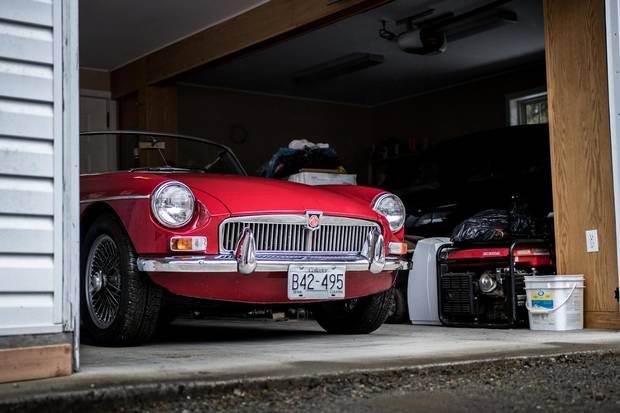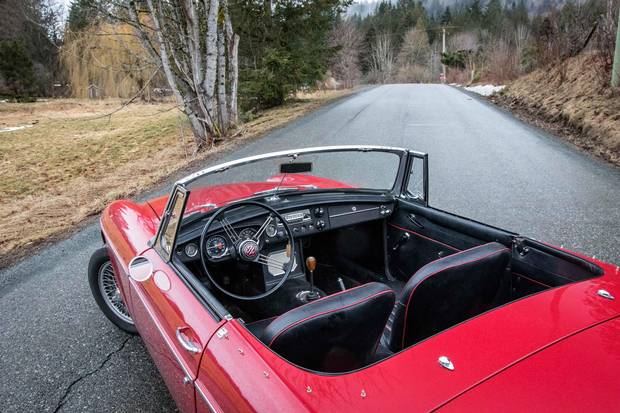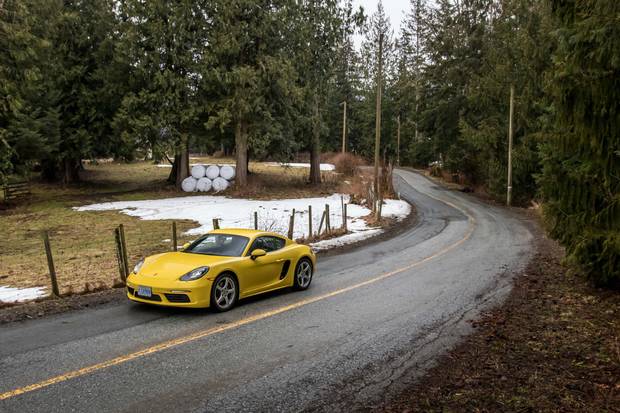Today, it started. Such is not always the case. My father cranked the key for what seemed like an eternity, muttered, "Come on," under his breath and, with a flatulent braap, the little crimson MGB burst to life. This time.
This is my father's 1967 MGB. It is a lively little thing, representing possibly the high point of the breed. It has clean lines, unblemished by the rubber bumpers and high ride height later models would sport, and it has a lovely set of refinished wire-spoke wheels with knock-on hubs. When it's warmed up and chugging along, its 1.8-litre four-cylinder rumbles and parps and sounds generally cheerful.
The appeal of this thing is clearly evident. It looks like fun, and it is. However, if you are not an initiate of the Church of the British Roadster, you're probably sitting there saying, "Sorry, what was that you said back there about the whole not-starting thing?"

The MGB’s ability to start on a given day would determine whether this car could be rolled out of the garage for a drive through the countryside.
Once, the English roadster ruled both the racetrack and the roads. There were all manner of flavours to experience, from the genteel styling of the big Healeys, to the mongoose-nimble Lotus Elan, to the slightly scandalous Jaguar E-Type.
Canadians embraced all these machines wholeheartedly, forming clubs to take them out racing on decommissioned airstrips and touring the countryside, and inadvertently helping hundreds of mechanics send their children to university.
That was all before my time, but I still have a great fondness for the MGB and its ilk. Dad bought it when I was only a few months old, and as a baby I was wedged into the parcel shelf on more than one occasion. Once, we drove all the way to the Okanagan like that. Safety hadn't been invented yet – later, like everyone else, we bought a Volvo.
Dad and I restored the MGB in the early 1990s, and by that I mean I handed him wrenches while he lay under the car and swore at it. My father is from Northern Ireland and hails from a strong rural tradition of swearing at machinery. I have adopted the practice and can report it's both effective and extremely therapeutic.
Aside from picking up an expanded and highly incandescent vocabulary, working on the MGB helped me learn about engines and gearboxes and brakes and suspension. It gave me an appreciation for the art of engineering and filled me with the lasting satisfaction that comes from taking something apart and being able to put it all back together again. It taught me problem-solving, and patience, and that you never really get all the grease out from under your fingernails.
Working on the MGB with my dad gave me an appreciation for the art of engineering, Brendan McAleer writes.
All this stuff sounds appealing and worthy, but let me point out a rather large caveat. While everybody might enjoy a puzzle or a crossword or other light challenge, no normal person sets up a chair on the side of a highway to pursue their hobby.
However, two summers ago, that's exactly where Dad and I were, sitting on the shoulder in the MGB with rueful expressions. On the first day of a three-day group classic car tour, the MGB had coughed, spluttered and then gone silent. It refused to start.
Two guys in a 1953 Alfa Romeo Giulietta Sprint Speciale pulled up. "Everything okay?" the driver asked.
Now look. Everyone knows British cars can be unreliable. They are sometimes cantankerous and always unpredictable. However, getting rescued by an Italian car? That's just not on.
The MGB decided to start.
The next day, it broke down twice. We eventually traced the trouble back to an intermittently failing fuel pump and were able to rig a temporary fix with some borrowed spare parts. On returning home safely (miraculously), my father bought and installed a new fuel pump, took the old one apart to see how it worked, called me up to describe – in detail – why it had failed and then fixed it.

Everyone knows British cars can be unpredictable. But the appeal of the MGB is that it looks fun - and it is.
New fuel pump or no, there was no guarantee the MGB would start today. However, it did, and we eased it out of the garage, crunching down the gravel driveway and out onto the country roads of my childhood.
It was a cold, damp day, with the snowline low on the mountains and a light rain misting the windshield. Dirty snow lay in the ditches and on the fields, winter still clinging, white-knuckled, to the landscape.
The 'B buzzed happily over the frost-heaved tarmac, open to the elements and tiny. It had rained heavily the day before. It was going to rain tomorrow. It would rain again this afternoon.
However, as is sometimes the case with an old British car such as this, our luck held. We stole a drive from the weather, took a few pictures, then tucked the car back in the garage. I headed back to the city.
As it happens, that week I was driving a Porsche – the new Cayman. It displayed almost relentless competence, darting through the corners with ease and dispatching the highway cruise effortlessly. Yet, something was perhaps missing.

Taking the new Porsche Cayman out for a spin after driving the MGB, it felt like something was missing.
As the traffic grew heavy with featureless crossovers and trucks, Rush's Red Barchetta came on the stereo. In the song, a young man defies the establishment by sneaking away for an illicit drive in a sports car from long ago. The lyrics are based on a Road & Track story written about an MGB in 1973.
It's a question of need. As the self-driving, shared-ownership future beckons, the man-machine connection will be severed. We will no more develop an affection for a car than we would for a laptop.
But the MGB needs an owner. It needs mechanical knowledge, careful handling, a certain level of driving skill. It requires understanding. Perhaps a car that won't start every time isn't for everyone. On the days it does, though, the experience is worth it.